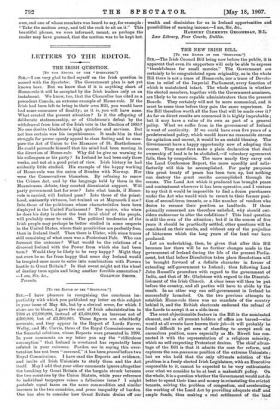LETTERS TO THE EDITOR.
THE IRISH QUESTION.
[To TIER EDITOR Or TOR " SPECTATOR:1
am very glad to find myself on the Irish question in accord with the Spectator. The Government plan is not yet known here. But we know that if it is anything short of Home-rule it will be accepted by the Irish leaders only as an instalment. We know, too, that the Chancellor has cited as precedent Canada, an extreme example of Home-rule. If the Irish bad been left to bring in their own Bill, you would have bad some assurance of finality; as it is, you will have none. What created the present situation ? Is it the offspring of deliberate statesmanship, or of Gladstone's 'defeat by the withdrawal from him of the Irish vote in the Election of 1885? No one doubts Gladstone's high qualities and services. But not less certain was his impulsiveness. It made him in that struggle for power openly appeal to class feeling and to compare the Act of Union to the Massacre of St. Bartholomew. Ile could persuade himself that his mind had been moving in the direction of Home-rule. Why did he give no warning to his colleagues or his party ? In Ireland he had been only three weeks, and not at a good point of view. Irish history he had evidently little studied. His example of the happy working of Home-rule was the union of Sweden with Norway. Nor were the Conservatives blameless. By refusing to renew the Crimes Act, and by the language held by them in the Maamtrasna debate, they courted disunionist support. Will party government last for ever P Into what hands, if Homerule is carried, will Ireland pass ? Into those of the priesthood,eininently virtuous, but trained as at Maynooth I saw ? Into those of the politicians whose characteristics have been displayed in the United Parliament ? The squire, who when he does his duty is about the best local chief of the people, will probably cease to exist. The political tendencies of the Irish people may perhaps be better studied in some respects 'in the United States, where their proclivities are perfectly free, thartin Ireland itself. Then there is Ulster, with some traces still remaining of what once was a Protestant Pale. Who can forecast the outcome ? What would be the relations of a divorced Ireland with the Power from which she had been torn ? Would they be likely to be very happy ? Might they not even be so far from happy that some day Ireland would be tempted once more to enter into combination with Powers 'hostile to Great Britain ? In that event might not the wheel of destiny turn again and bring another forcible annexation?
—I am, Sir, &c., GOLDWIN SMITH. Toronto.






































 Previous page
Previous page